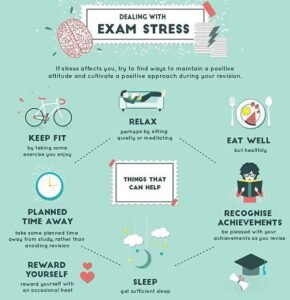
04 Jan Exam Anxiety in Children
Exam anxiety is a specific type of anxiety that can affect anyone as it is event-specific and involves an emotional response of fear, uneasiness, and apprehension to being critically examined
It has been estimated to affect 10-40% of all students to varying degrees
The potential impact of this is that pupils feel disengaged with their work as a form of self-preservation, as a key component of anxiety is avoidance of fearful situations. Furthermore, people with anxiety often worry about the future due to fear of damaging one’s self-perception, which is particularly relevant to exams as performance in tests is, unfortunately, the way many young people are taught will determine their value as individuals and will affect their future immensely.
Consequently, evidence suggests that pupils with high exam anxiety achieve a grade lower at board exams compared to if their anxiety had been low.

Not only does the stress of taking exams divide attentional resources, but it can also result in the activation of the sympathetic nervous system so that physical symptoms of arousal such as sweating, increased heart rate, and muscle tension disrupt the recall of information. Furthermore, a process called social derogation can occur in which pupils experience exam anxiety due to fear of the reactions of others were they to fail. Overall, clearly, these responses can be detrimental to exam performance.



Sorry, the comment form is closed at this time.